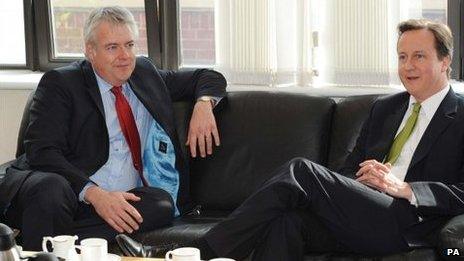EU deal 'fails Wales' says First Minister Carwyn Jones
- Published

First Minister Carwyn Jones says David Cameron's UK government must deliver a fair settlement to Wales following the EU budget deal
The first minister says the EU budget cut could be "deeply unfair" to the poorest parts of west Wales and the valleys.
EU leaders agreed a 908bn euros (£768bn) budget limit for 2014 to 2020, about 3% lower than the current seven-year period.
Carwyn Jones said early estimates show Wales could lose £400m in funding.
But Prime Minister David Cameron said it would be "good for the UK and good for Europe".
Responding to the deal, the First Minister Carwyn Jones warns that the agreement "fails to deliver" for Wales.
He said this would result in significant cuts to funding programmes.
"We are disappointed that the agreement fails to deliver the level of investment in jobs and growth needed in Wales," said Mr Jones.
"We are especially concerned that the most vulnerable part of Wales - west Wales and the Valleys - appears to be losing out to wealthier regions in the UK. This cannot be seen as a fair reflection of priorities for Wales.
"Despite all of our efforts to promote a fair deal to protect Wales' interests, the agreement reached by the European Council is deeply unfair to the poorest parts of the EU.
"The prime minister says this is a 'good deal for Britain'. He will need to explain how it's a good deal for Wales."
'Siphoned away'
Speaking after the marathon negotiations in Brussels, David Cameron said he could look the taxpayer in the eye and argue that he had helped deliver the agreement.
"I think the British public can be proud that we have cut the seven-year credit card limit for the EU the first time ever," he said.
The deal would see a fall in the share of money given to agriculture, while protecting areas such as research and development, he said, adding that "working with allies it is possible to take real steps towards reform in the European Union".
But the Welsh first minister said the agreement had come at a high price for Wales.
"The Welsh government has always recognised the need for discipline in the overall EU budget but it cannot be right for EU money allocated to the UK to be siphoned away from poorer regions, like west Wales and the Valleys - to richer regions elsewhere," he said.
"We must now look to the UK government to make a fair allocation to Wales of its much reduced structural funds budget, so that we can continue our work in transforming the economy of our country."
Dr Elizabeth Haywood, director of the South East Wales Economic Forum, told BBC Radio Wales it looked like west Wales and the valleys would get £400m less, but it was possible to make improvements in how the funds received were spent.
"I argued when I was chairing the city regions task group... we should be looking at some regionally-significant programmes rather than having lots of little dissipated mini-programmes all over the area," she said.
"If we could actually achieve that this time round, we could end up getting more value out of our European funds.
"I think it's also got to be remembered that whatever you put in, in terms of European funding, has to be match-funded from somewhere else and of course that's been getting more difficult as the economy has been in a more difficult state."
Dr Haywood added there was the possibility Wales would not have been able to spend the amount it received because match funding could not be found.
- Published8 February 2013
- Published22 November 2012
- Published8 November 2012